Imagine being on a tropical island, and your best mate asks you to join them in signing up for an Open Water scuba diving course. You say yes, of course, but after you’ve paid a deposit, it slowly dawns on you that you have no idea what you signed up for and what it entails! So, here is our guide on scuba diving for beginners and how to best prepare for your first experiences as a scuba diver!
Scuba Diving for Beginners
Firstly, what exactly is scuba diving, and an Open Water scuba diving course?
Scuba diving involves using a scuba tank or cylinder that you can breathe from underwater. It allows you to explore and observe the marine life for longer periods of time than if you were snorkeling.
Read More: Snorkeling vs. Scuba Diving Differences
The Open Water diving course is the first certification you can get as a recreational scuba diver. It is the first time scuba diving for beginners. Being a certified or licensed diver means that you and another certified diver will have the knowledge and physical skills to go on a dive together, without the need for supervision from a professional diver.
Having an Open Water certification is a step-up from going on a ‘Try Dive.’ A try dive is a scuba dive under close and direct supervision from an instructor who will give you the basics of diving to try it out. This is not a license to dive, which is why if you are interested in the blue open water of the ocean, you should get your open water diving certification!
Read More: Do You Need to be Certified for Scuba Diving?
Let’s Jump In!
Practice Being Comfortable in the Water
It may seem obvious but many people overlook this crucial step. You should definitely have a level of comfort in the water before embarking on a diving course. You don’t have to be the next Olympic swimmer, or even a great swimmer, but you should be able to relax and move around in the water (without touching the ground).
There is a swimming and floating requirement in the course, and while it is not a timed swim, you will need enough comfort and stamina to complete this. You will also feel more secure, and thus, more relaxed on a dive if you enjoy being in the water.
Have a Level of Fitness
Scuba diving allows you to be weightless in the water, which means it is not as stressful on your body compared to running or various high intensity exercises.
However, scuba diving is considered an extreme sport as you will be swimming and kicking with your legs underwater, and possibly carrying your heavy equipment on-land. Scuba diving is accessible for children and there is no maximum age for divers, but you should be relatively fit.
You may also scuba dive if you have a disability. There are many adaptive techniques that can be used with some of the physical requirements of the course.
Be Prepared to Study
The Open Water course consists of book or online study, knowledge reviews, quizzes, and yes, an exam! To be a certified and prepared scuba diver, the course will give you a lot of useful information. From physics to physiology, the course will require you to study, learn, and retain this information.
But, don’t stress! Remember, children from the age of 10 years old can also complete this course. (No pressure!)
Be Open to New Experiences
You don’t need to be an amazing swimmer or a physics whiz to be able to ‘get’ your open water certification. But you should be prepared to learn new things and be open to new experiences during your course.
Breathing underwater is not natural to our bodies, so it is okay to not feel 100% comfortable or skilled straight away. We have seen so many people, during their course, get frustrated, disappointed, or even angry at themselves, for not being able to perfect a skill or ‘get it’ on their first experience.
Take it easy, and remember you will face new and exciting experiences during your course.
Read More: What to Expect when Learning How to Dive
Choose Your Location & Instructor Carefully
There is a big difference between learning to dive in cold temperatures such as in Canada, or learning to dive in the Caribbean Cayman Islands. The location will certainly impact your experiences of diving, and can make or break your enjoyment of the dive.
Scuba diving in warmer temperatures is, generally more enjoyable and comfortable. However, sometimes circumstances will not allow this, so don’t let that put you off from learning to dive. It is very popular for people to do their open water course close to home, wherever that may be, and then use that certification and the learned skills for their next tropical holiday.
The main thing when preparing for your open water diving course is to choose a dive operation and your instructor carefully. Use online resources and social media to read reviews and get a feel of the dive operation.
Things to look for at a dive centre include;
- Their safety standards
- Scuba diving equipment and how it is maintained
- What exactly is included in your Open Water course
- Recommendations and reviews from previous students
- What dive agency is being offered, eg. PADI, SSI, NAUI, BSAC, etc.
When you get to your chosen dive centre, feel free to ask to meet your instructor and get a feel for how they are. There are a lot of dive instructors, some amazing, some good, and unfortunately, there can be some dreadful instructors too. Make sure you are comfortable with your instructor, as ultimately, they will be responsible for your safety and your enjoyment during the course.
Get Your Own Mask
This is a point that I would stress to my own open water diving students when I was teaching them scuba diving. It is so important to have your own mask that you are comfortable with wearing.
Aside from the hygiene factor (no one wants to share a mask that’s been snotted or spat into!), having your own mask means that it can mold to your face shape over time. This allows the mask to seal completely to your face, limiting water leaks. Having your own mask also means that you can keep the mask strap adjusted to your comfort; not too tight and not too loose.
Read More: My Tips on How to Stop a New Mask from Fogging Up!
Beuchat Maxlux S Mask
No joke, I have owned 4 of these Beuchat Maxlux masks. My first one was the dark blue, then pink, then ultra blue, and now black.
The mask silicon skirting is soft and molds to your face easily. It’s suitable for small and large faces. It is also frameless and incredibly low-profile (fits close to your face) which means you have amazing panoramic vision.
Have Fun with the Open Water Diving Course!
Most of all, the top tip in scuba diving for beginners is to have fun! Scuba diving is supposed to be an amazing and exciting experience, not scary or filling you with anxiety or dread. If you are not having fun, then don’t feel the need to push yourself into doing the course.
Take your time to be prepared, and this is how you will get the most out of your open water scuba diving course!


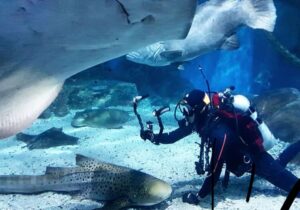


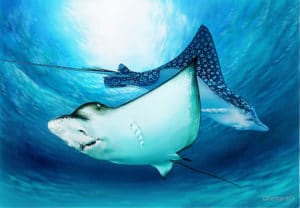
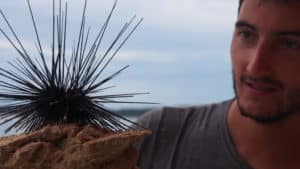
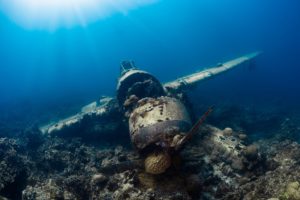

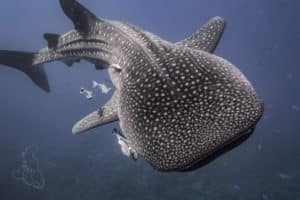
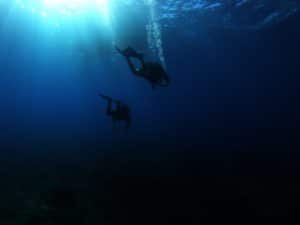
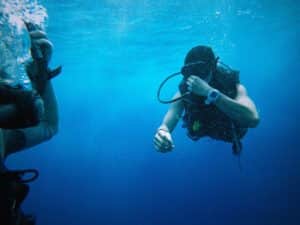


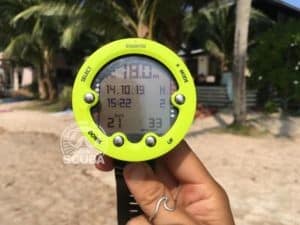
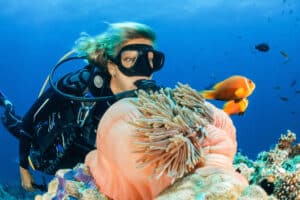
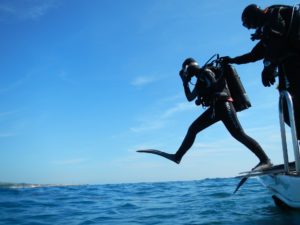
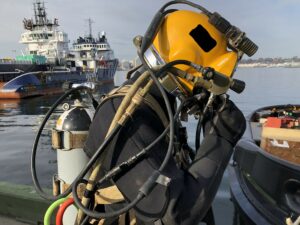
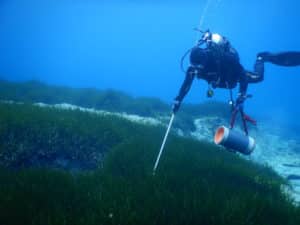
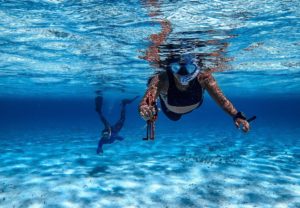
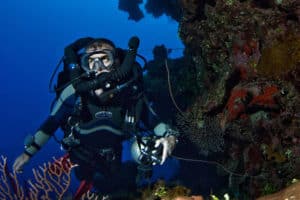
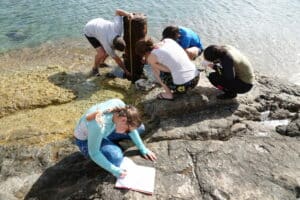
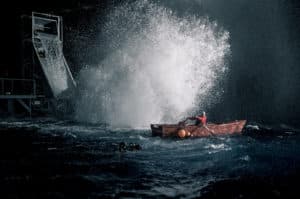
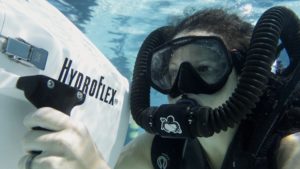
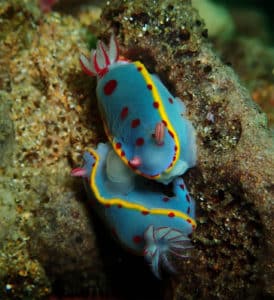
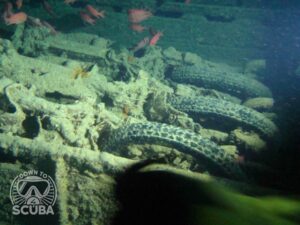
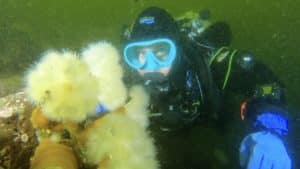
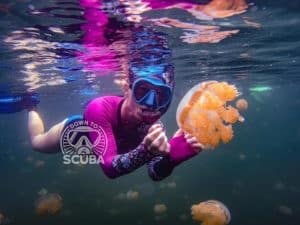
Leave a Reply
You must be logged in to post a comment.